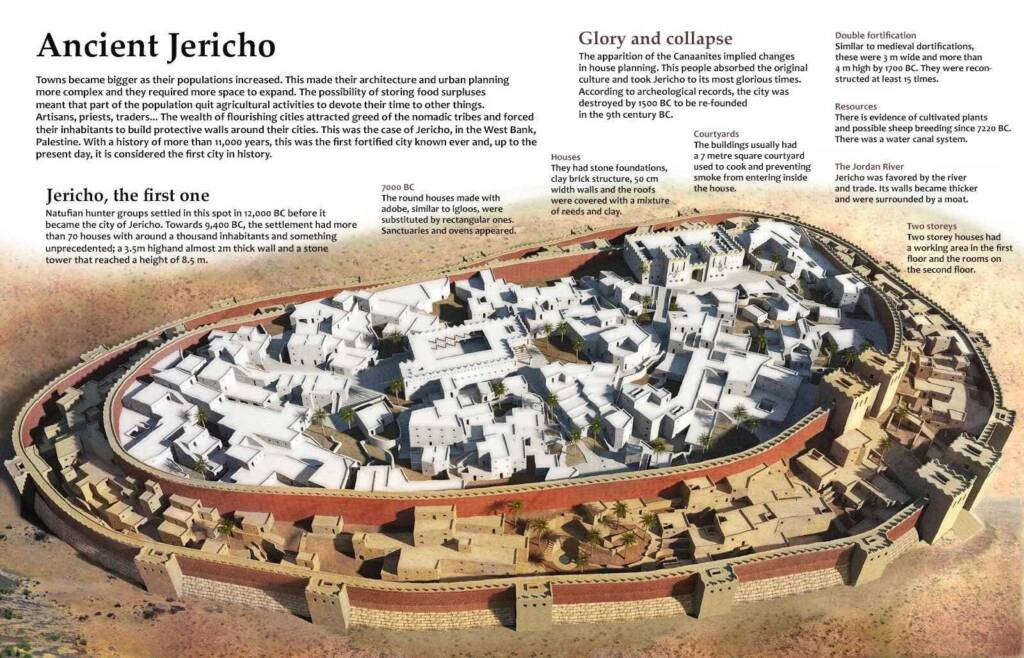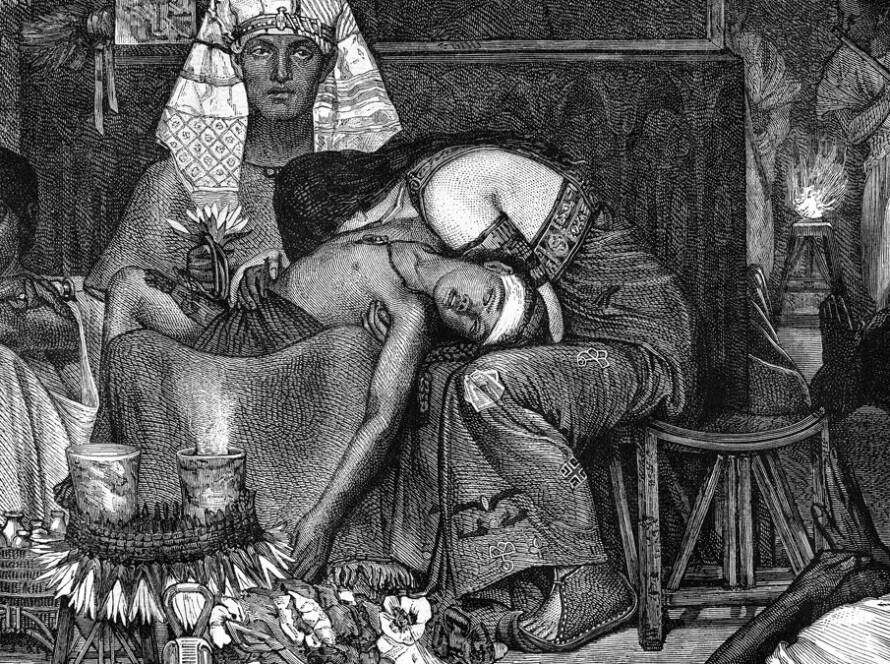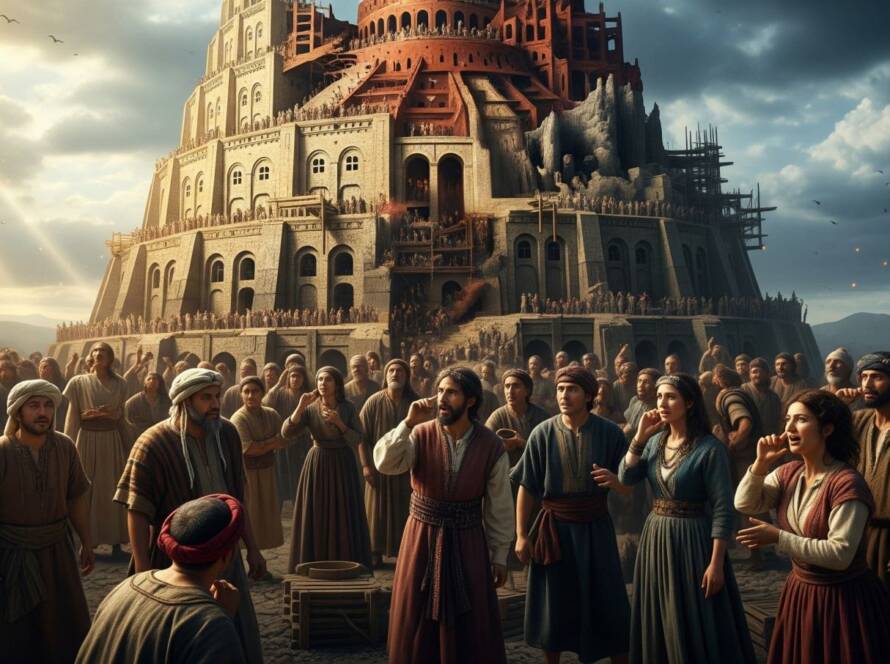The Fall of Jericho: By Faith Alone
Of all the cities in the ancient world, few capture the imagination quite like Jericho. Its name is synonymous with impenetrable walls and a miraculous, earth-shaking fall. The story of Jericho’s destruction, as recounted in the Book of Joshua, is a foundational tale of faith, obedience, and divine intervention that has resonated for millennia. It is a narrative woven from towering fortifications, a woman’s courage, the blast of trumpets, and the power of the Ark of the Covenant.
The Impenetrable City
Located in the Jordan Valley, ancient Jericho was a formidable prize. Often called “the city of palm trees,” it was a lush oasis and a crucial strategic stronghold guarding the entrance to Canaan.
Its most defining feature was its defense system: a massive double wall. The outer wall was approximately six feet thick, and the inner wall was even more robust, at about twelve feet thick, with a significant gap between them.
Some archaeologists suggest these walls were built on a sloping stone revetment, making them virtually impossible to scale or breach with the military technology of the time. For the Israelite tribes, fresh from their desert wanderings, Jericho was not just a city; it was the first and greatest obstacle to claiming the land they believed was promised to them by God.
The Spies and the Savior: Rahab’s Act of Faith
Before any military action, Joshua, the leader of the Israelites, sent two spies into the city. Their mission was perilous, and their presence was soon discovered. The king of Jericho ordered their capture, but they found an unlikely protector in Rahab, a woman who lived in a house built into the city wall.
Rahab, despite being a Canaanite and a prostitute, had heard of the God of Israel and the miracles He had performed for His people. She recognized a power greater than Jericho’s walls. Hiding the spies on her roof under stalks of flax, she boldly lied to the king’s men, sending them on a false chase.
In return for her family’s safety, she secured a promise from the spies: when the Israelites attacked, she was to hang a scarlet cord from her window, and all within her house would be spared. Rahab’s story is one of remarkable faith and pivotal courage, demonstrating that loyalty to the divine can transcend nationality and social standing.
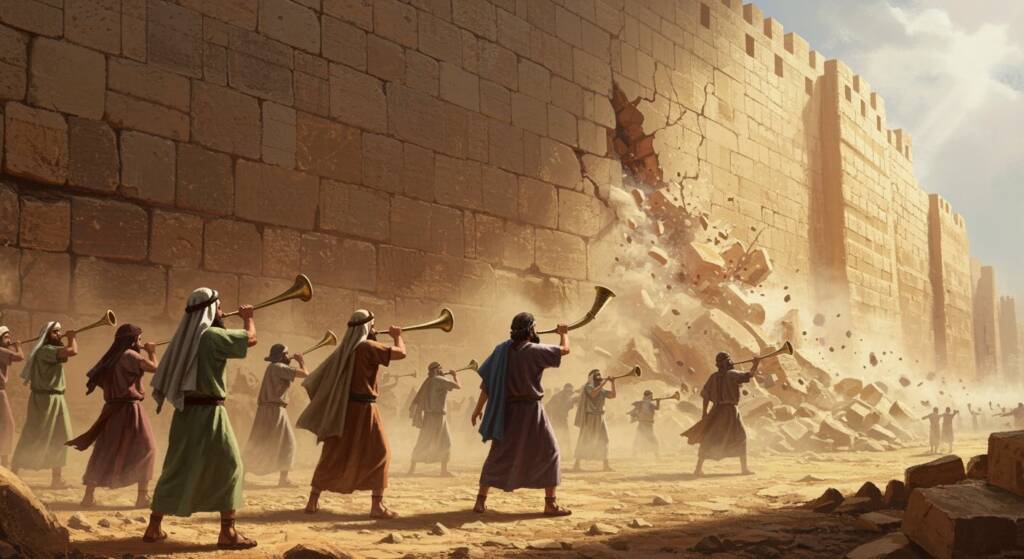
The Divine Strategy: A March of Faith
The plan delivered to Joshua for conquering Jericho was unlike any military strategy before or since. There were no siege engines, no battering rams, and no scaling ladders. Instead, it was a ritual of faith.
The Israelite army, led by seven priests blowing trumpets made of rams’ horns (shofars), was to march around the city once a day for six days. The Ark of the Covenant, the sacred chest representing God’s very presence among His people, was carried before them. The city watched, no doubt bewildered by this silent, processional army.
For six days, the routine was the same: a single, silent march, broken only by the blast of the shofars. Then, on the seventh day, they rose at dawn and marched not once, but seven times. On the seventh circuit, as the priests blew a long, piercing blast on the trumpets, Joshua gave the command: “Shout! For the Lord has given you the city!”

The Fall of the Walls
What happened next is the climax of the story. As the people shouted with a great cry, the walls of Jericho crumbled. The Hebrew verb used suggests a collapse “beneath itself.” The mighty fortifications, the pride of the city, were reduced to rubble.
The Israelite army charged straight into the city, overcoming a defense that had already been divinely dismantled.True to their oath, the two spies went to Rahab’s house, marked by the scarlet cord, and brought her and her family to safety outside the camp of Israel.
Jericho was then devoted to destruction, a practice known as herem, with its wealth consecrated to the Lord’s treasury. The city was burned, and a curse was pronounced upon anyone who would dare to rebuild it, a curse famously fulfilled centuries later during the reign of King Ahab (1 Kings 16:34).
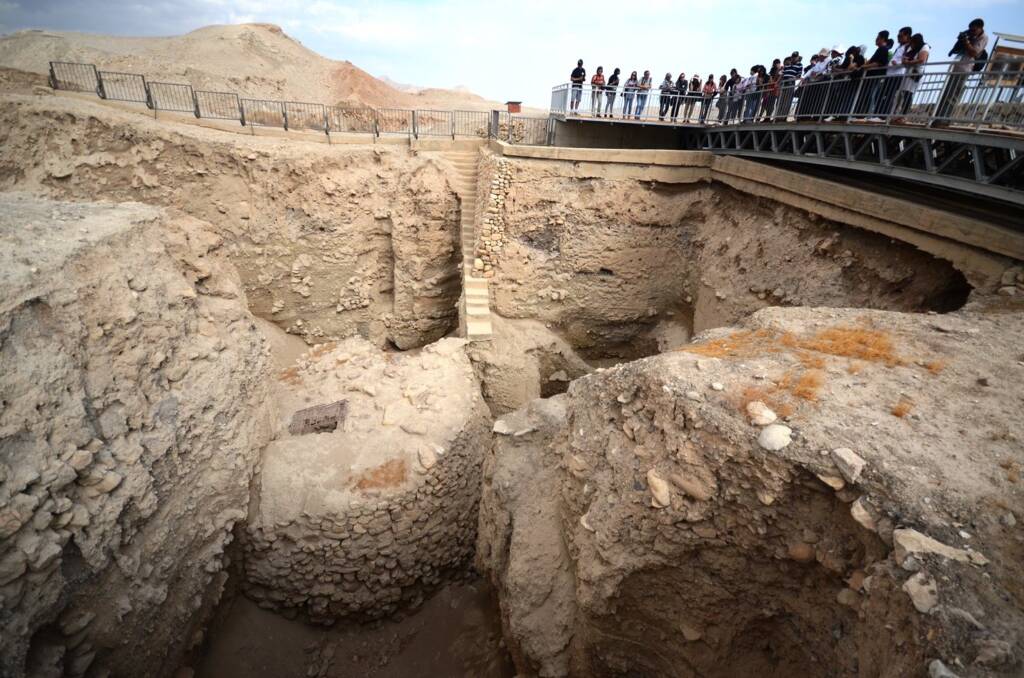
History and Faith: The Archaeological Debate
The historicity of the Battle of Jericho is a subject of intense debate among archaeologists. Excavations at the site (Tell es-Sultan) have revealed that Jericho is one of the oldest continuously inhabited cities in the world, with evidence of destruction layers.
The most prominent destruction, featuring collapsed walls and widespread fire, is dated by some scholars to around 1550 BCE, which is earlier than the generally accepted timeline for Joshua (c. 1400-1200 BCE). This has led many mainstream archaeologists to conclude that the city was already a ruin by the time the Israelites arrived.
However, other scholars point to evidence of a smaller, fortified settlement at the site during the Late Bronze Age and argue for a different chronology that aligns the destruction more closely with the biblical narrative.
For many people of faith, the story stands as a testament to God’s power, regardless of archaeological interpretations. It serves as a powerful metaphor: that the most insurmountable obstacles in life can be overcome not by human strength alone, but through faith and obedience.
The Echo of the Trumpets
The fall of Jericho remains one of the most iconic stories in the Western world. It is a tale of the walls that confine us—whether they are made of stone, fear, or circumstance—and the faith required to see them fall. From the blare of the shofars to the quiet courage of Rahab, from the silent marches to the final, triumphant shout, the story of Jericho endures as a timeless narrative of divine power intervening in human history, proving that no wall is too high when faith leads the way.
Here’s a heartfelt prayer inspired by the faith and endurance of those who marched around the walls of Jericho — a prayer for strength, courage, and unwavering trust in the Lord.
Heavenly Father,
You are the God who brings walls down and hearts to life.
Just as You gave Joshua and his people the faith to march around Jericho,
give us that same strength to walk through the trials of our own lives.
When the obstacles before us seem unshakable,
teach us to trust not in our might, but in Your power.
When we grow weary from the journey,
remind us that every step taken in faith is seen by You,
and that Your promises never fail.
Lord, help us to march in silence when You call us to wait,
and to shout with praise when victory draws near.
Let our hearts be steadfast, our spirits unbroken,
knowing that You are fighting the battle we cannot see.
Break down the walls of fear, doubt, and despair within us.
Replace them with courage, perseverance, and joy.
May our lives echo the sound of those ancient trumpets —
a song of faith, declaring that the Lord is mighty to save!
We place our trust in You, O God of Jericho,
for the same power that brought down walls
can lift us through every storm.
In Jesus’ holy name we pray,
Amen.
The Song: The Walls Must Fall
“Walls of Jericho” is a dramatic, folk-inspired ballad that retells the legendary biblical siege led by Joshua. Set against a backdrop of ancient warfare and divine intervention, the song captures the tension and triumph of Israel’s march around the fortified city. It opens with the covert mission of the spies and Rahab’s courageous act of sheltering them, then builds through the ritualistic procession of the ark and the sounding of trumpets.
The chorus erupts with the miraculous collapse of Jericho’s walls—not by force, but by faith—underscoring the power of obedience and divine promise. Tribal drums and haunting vocals evoke the spiritual gravity of the moment, while lyrical imagery like “a crimson cord fluttering in the wind” and “stones that break by heaven’s hand” bring the story to life.
Verse 1
Out in the desert, the sun beat down Joshua stood on holy ground Sent out spies through the city gate Rahab hid them, sealed their fate
She tied that cord of crimson thread A promise made, a word she said While Jericho slept behind its wall The Lord had planned its mighty fall
Chorus
Seven days they marched in line With the ark and trumpets, a sacred sign Round and round, no sword was drawn But faith would bring the fortress down
On the seventh day, the trumpets cried The walls gave way, no place to hide Jericho fell, the earth did quake By heaven’s hand, the stones did break
Verse 2
The priests stepped forth, the horns blew loud The people shouted, fierce and proud No battering ram, no fire or blade Just holy wrath and vows they made
Rahab watched from her window high Her house still stood as stones flew by She kept her word, her life was spared While Jericho crumbled, unprepared
Bridge
The ark of covenant led the way A symbol strong of Yahweh’s sway No mortal king, no army’s might Could stand against that sacred light
Final Chorus
Seven days they marched in line With the ark and trumpets, a sacred sign Round and round, no sword was drawn But faith would bring the fortress down
On the seventh day, the trumpets cried The walls gave way, no place to hide Jericho fell, the earth did quake By heaven’s hand, the stones did break
Outro
So let the story echo still Of walls that fell by heaven’s will When faith was strong and hearts were bold Jericho’s tale forever told

Bible Study: The Walls of Jericho and the Power of Faith
Key Passage: Joshua Chapters 2 & 6
Central Theme: Overcoming seemingly impossible obstacles through faithful obedience to God.
Opening Prayer:
Lord, as we open your Word today, open our hearts and minds. Teach us through the story of Jericho what it means to trust you fully, especially when we face our own “impossible walls.” Give us the courage of Joshua and the faith of Rahab. In Jesus’ name, Amen.
“Now Jericho was tightly shut up because of the Israelites. No one went out and no one came in.” (NIV)
Discussion Questions:
Describe a “wall” you are currently facing in your own life. This could be a fear, a financial hurdle, a broken relationship, a persistent sin, or an seemingly unattainable goal.
Read Joshua 6:1. The city was “tightly shut up.” How does it feel when a problem seems impenetrable and there is no obvious way in or out?
From a human perspective, what were Israel’s chances of taking Jericho by military force alone? Why is it significant that God didn’t give them a conventional battle plan?
“I know that the Lord has given you this land,” she said to them. “…For the Lord your God is God in heaven above and on the earth below.” (Joshua 2:9, 11, NIV)
Discussion Questions:
Rahab was a Canaanite prostitute—an outsider in every way. What does her profound confession of faith (v. 9-11) teach us about who God can save and use for His purposes?
Rahab’s faith was based on hearing about God’s works (the Red Sea, victories east of the Jordan). How can hearing testimonies of God’s faithfulness in the lives of others strengthen our own faith?
The scarlet cord was a physical sign of her faith and her covenant with the spies. What are the “scarlet cords” in our lives—the symbols and reminders of God’s promises and salvation (e.g., baptism, communion, a specific Bible verse)?
“Then the Lord said to Joshua, ‘See, I have delivered Jericho into your hands… March around the city once with all the armed men. Do this for six days.'” (Joshua 6:2-3, NIV)
Discussion Questions:
Put yourself in the shoes of an Israelite soldier. What might have been your thoughts and doubts about God’s bizarre battle plan?
Why do you think God chose a method that required patience, silence, and ritual instead of immediate military action? What does this teach us about how God often works?
The Ark of the Covenant, representing God’s presence, was at the center of the procession. What is the significance of keeping God’s presence central as we “march” against our own challenges?
“When the trumpets sounded, the army shouted, and at the sound of the trumpet, when the men gave a loud shout, the wall collapsed; so everyone charged straight in, and they took the city.” (Joshua 6:20, NIV)
Discussion Questions:
The Israelites had to obey for seven days before seeing any result. Where in your life is God calling you to persistent, patient obedience even when you see no change?
The victory was ultimately achieved by God’s power (“the Lord has given you the city” – v.16), but it was activated by the people’s faithful shout. How does this illustrate the partnership between God’s sovereignty and our faithful response?
Rahab and her family were saved in the midst of the judgment, just as we are saved in Christ from the judgment we deserve. How does her story point to the gospel?
Application & Reflection
Identify Your Wall: Revisit the “wall” you identified at the beginning. After studying this passage, how does your perspective on it change?
God’s Unconventional Way: Is God possibly asking you to tackle this problem in an “unconventional” way—perhaps through forgiveness instead of retaliation, generosity instead of hoarding, or silent trust instead of frantic action?
The Scarlet Cord of Remembrance: Choose one promise of God from Scripture to be your “scarlet cord” this week—a specific reminder of His faithfulness and salvation as you face your challenge.
Closing Prayer:
Heavenly Father, thank you for the incredible story of Jericho. It reminds us that no wall is too tall for you, and that you often use the most unlikely people and methods to accomplish your will. Forgive us for relying on our own strength and wisdom. Give us the faith of Rahab and the obedient perseverance of Joshua. Help us to keep our eyes on you, the Ark of our salvation, and to trust that at the right time, our shout of faith will coincide with your mighty power. In Jesus’ name, Amen.


